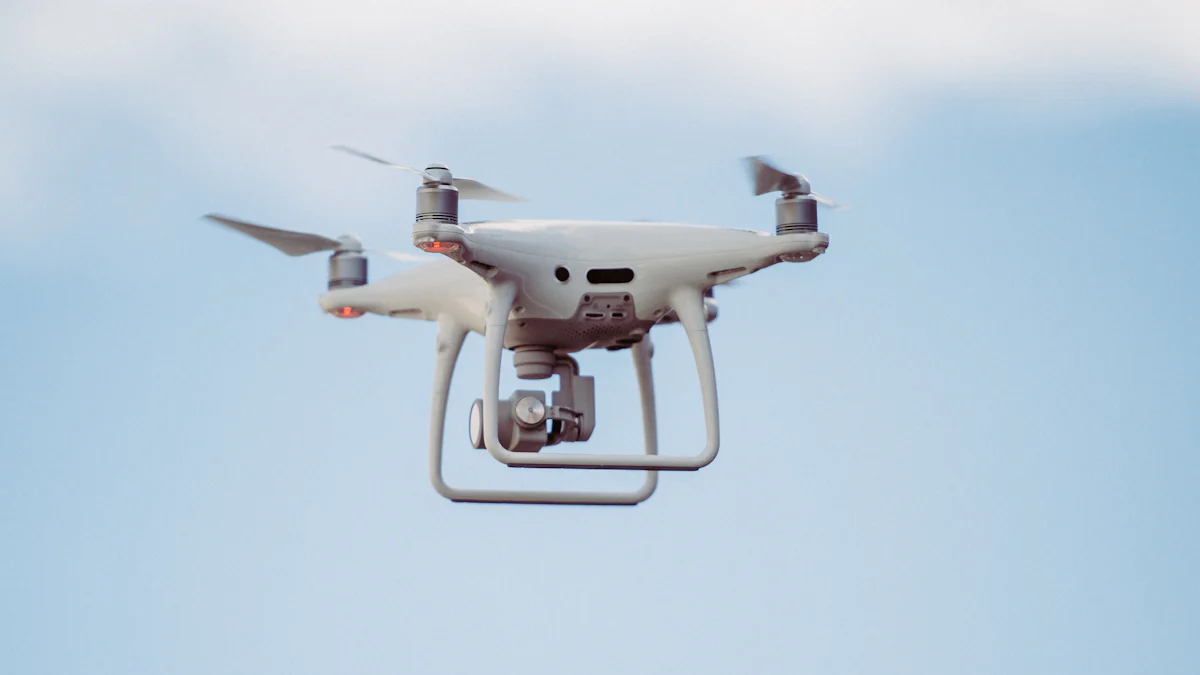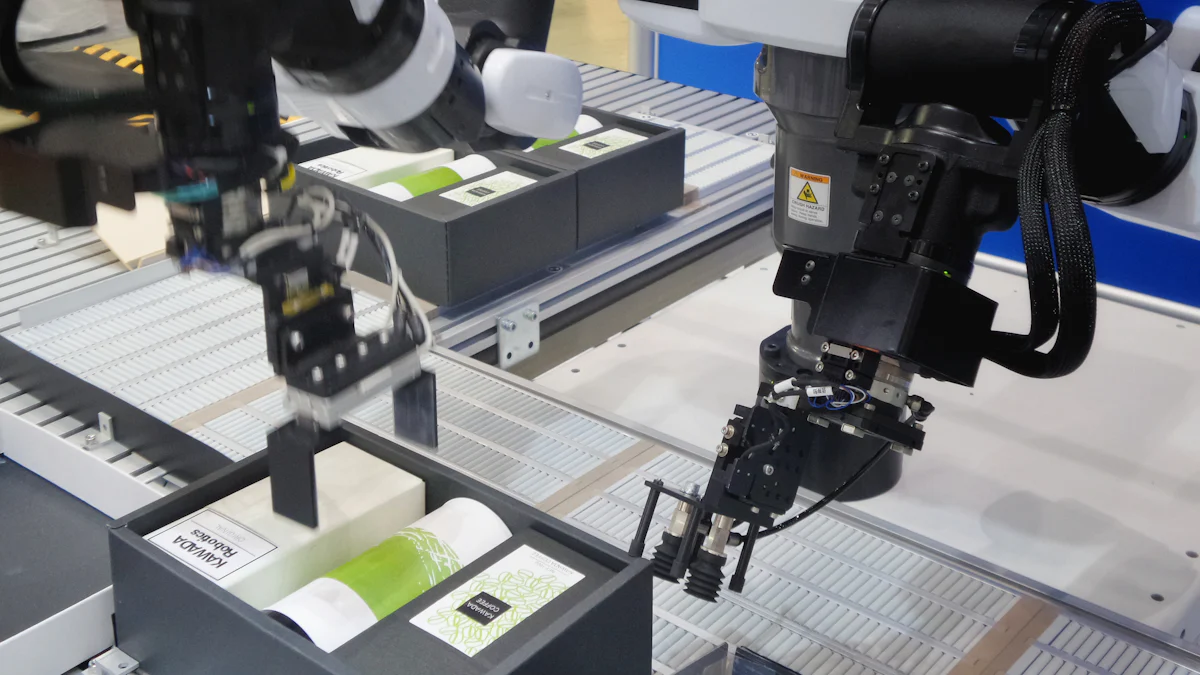Logistics Tech Breakthroughs: A Journey into the Future

Logistics technology revolutionizes the way businesses manage their operations, from production to delivery. Its significance in modern business cannot be overstated, driving efficiency and customer satisfaction. In this blog, we delve into the key technological advancements reshaping the industry, propelling it towards a future where automation, AI, blockchain, and IoT redefine logistics processes.
The Rise of Automation

In the realm of logistics technology, automation stands as a beacon of progress, transforming traditional practices into streamlined and efficient operations. Embracing robotics in warehousing has become a cornerstone for many businesses seeking to enhance their logistical capabilities. Through innovative robotic solutions, warehouses have witnessed a surge in efficiency, resilience, and economic growth. These advancements not only optimize processes but also pave the way for a more sustainable future.
Efficiency Improvements
One of the primary advantages of integrating robotics in warehousing is the significant boost in operational efficiency. By automating repetitive tasks and optimizing workflows, companies can achieve higher productivity levels while minimizing errors. Case studies on warehouse automation showcase how these technological interventions lead to increased throughput rates and enhanced order accuracy. The seamless coordination between human workers and robotic systems ensures a harmonious balance that maximizes output.
Cost Reduction
Cost-effectiveness is another compelling reason why businesses are increasingly turning to robotics for their warehousing needs. Implementing automated solutions reduces labor costs associated with manual tasks and mitigates the risks of human error. As highlighted in various resources exploring emerging trends in logistics, the adoption of robotics results in substantial savings over time. Companies can reallocate resources towards strategic initiatives by leveraging robotic technologies that offer long-term value and sustainability.
Automated Vehicles
The integration of automated vehicles marks a paradigm shift in transportation logistics, revolutionizing last-mile delivery services and supply chain management strategies. Self-driving trucks have emerged as a game-changer in the industry, offering unparalleled efficiency and safety benefits. These autonomous vehicles navigate roads with precision, ensuring timely deliveries while minimizing fuel consumption and carbon emissions.
Self-Driving Trucks
Self-driving trucks exemplify the pinnacle of technological innovation in logistics, redefining how goods are transported across vast distances. By harnessing AI-driven algorithms and sensor technology, these vehicles operate autonomously, enhancing road safety and optimizing route planning. Real-world case studies on multi-AMR warehouse automation underscore the transformative impact of self-driving trucks on operational speed and cost-effectiveness.
Drones for Delivery
In addition to ground-based automation, drones have emerged as a disruptive force in the realm of delivery services. Leveraging cutting-edge technology, drones offer swift and agile solutions for last-mile deliveries, especially in urban areas with congested traffic conditions. By adopting drone delivery systems, businesses can expedite order fulfillment processes while reducing their carbon footprint—a crucial step towards achieving sustainability goals.
AI and Machine Learning
Predictive Analytics
Artificial intelligence (AI) and machine learning (ML) are revolutionizing the logistics industry, offering advanced data analytics capabilities that drive efficiency and enhance customer satisfaction. By leveraging predictive analytics, companies can anticipate demand patterns, inventory fluctuations, and potential disruptions with precision. Through the analysis of historical data and real-time information, AI-powered systems optimize inventory levels, minimize stockouts, and streamline supply chain operations.
Demand Forecasting
Incorporating machine learning into demand forecasting processes enables businesses to predict customer demands accurately. By analyzing vast amounts of data, AI algorithms extract valuable insights that guide strategic decision-making. This proactive approach ensures that the right products are available at the right place and time, enhancing operational efficiency and ultimately boosting customer satisfaction levels.
Inventory Management
Machine learning plays a pivotal role in optimizing inventory management practices within warehouses. By tracking shipments, predicting customer demands, and suggesting optimal stocking levels for each item, ML tools facilitate cost reduction and improve delivery timelines significantly. The ability to automate order fulfillment processes based on predictive analytics results in reduced operational costs and enhanced overall warehouse performance.
Prescriptive Analytics
Logistics companies are increasingly turning to prescriptive analytics powered by AI to optimize route planning and enhance supply chain efficiency further. Determining the most efficient routes for transportation is crucial in reducing costs, fuel consumption, and delivery times. AI algorithms analyze multiple variables such as distance, traffic conditions, delivery windows, and vehicle capacities to optimize routes effectively.
Route Optimization
AI-driven route optimization solutions offer a comprehensive approach to logistics management by considering various factors simultaneously. These technologies automate repetitive tasks related to routing decisions while predicting demand fluctuations accurately. By leveraging ML algorithms for real-time route adjustments based on traffic patterns or unforeseen circumstances like weather disruptions, companies can achieve significant cost savings while ensuring timely deliveries.
Supply Chain Efficiency
Enhancing supply chain efficiency through AI-driven prescriptive analytics is a game-changer for modern logistics operations. By automating order processing workflows and optimizing scheduling tasks using ML algorithms, businesses can streamline their supply chain processes effectively. The integration of AI-powered chatbots for customer support services further enhances operational efficiency by providing real-time assistance to customers regarding order tracking or general inquiries.
Blockchain in Logistics
Transparency and Security
Blockchain technology offers enhanced security, transparency, and traceability in logistics operations. It enables secure and tamper-proof recording of transactions, contracts, and shipments. As O’Sullivan, an expert in Blockchain Technology, emphasizes, "For the logistics industry, Blockchain technology promises to create transparency of all documents and transactions across the globe, freight scenario, ultimately increasing the efficiency, agility, and innovation of supply chains." This revolutionary technology plays a pivotal role in ensuring that every step of the logistical process is securely documented and easily accessible.
Fraud Prevention
One of the key advantages of implementing blockchain in logistics is its ability to prevent fraud effectively. By creating an immutable ledger that records each transaction or document alteration, blockchain technology significantly reduces the risk of fraudulent activities. As highlighted by Badzar, a Logistics expert, "Blockchain technology in logistics can contribute significantly to the transparency of the entire production chain; it is considered as information disclosure and is recognized as the key component to make a business sustainable." This level of transparency acts as a deterrent against fraudulent practices within supply chains.
Data Integrity
Maintaining data integrity is paramount in logistics operations to ensure that information remains accurate and unaltered throughout the supply chain journey. With blockchain technology, data integrity is guaranteed through its decentralized nature and cryptographic mechanisms. According to Tijan et al., experts in Supply Chain Management, "It is interesting for the parties involved in the logistics process to introduce and develop blockchain technology to improve the logistics processes in the supply chain, making them more sustainable." By leveraging blockchain's inherent characteristics, businesses can uphold data integrity standards while fostering trust among stakeholders.
Smart Contracts
In addition to enhancing transparency and security, blockchain introduces smart contracts that revolutionize contractual agreements within logistics operations. These self-executing contracts are programmed with predefined conditions that automatically trigger actions when specific criteria are met. Smart contracts on blockchain platforms can automate payment settlements, customs documentation, compliance verification processes as mentioned by industry experts. This automation not only streamlines operational workflows but also reduces paperwork burdens significantly.
Automated Transactions
Automated transactions facilitated by smart contracts streamline financial interactions between parties involved in logistics processes. By eliminating intermediaries and automating payment settlements based on predefined conditions being met accurately reflect real-world scenarios efficiently. The implementation of automated transactions ensures timely payments while reducing administrative overheads associated with traditional financial processes.
Reduced Paperwork
The integration of smart contracts on blockchain platforms leads to a substantial reduction in paperwork traditionally required for documenting transactions within supply chains. As chronic issues persisting within global trade logistics continue to challenge industry players according to industry insights: "Chronic issues in global trade logistics have led to disjointed competitive environments; however, applying blockchain technology could unlock potential by addressing these persistent issues with greater efficiency." The automation provided by smart contracts not only simplifies documentation processes but also enhances trust among supply chain partners through transparent record-keeping mechanisms.
By embracing blockchain technology's capabilities such as enhancing transparency through secure record-keeping (as per O’Sullivan), preventing fraud (as per Badzar), maintaining data integrity (as per Tijan et al.), automating transactions (as per experts), reducing paperwork burdens (as per industry insights), businesses can revolutionize their logistical operations for increased efficiency and sustainability moving forward into 2024.
IoT and Real-Time Tracking

Sensor Technology
In the realm of logistics, IoT devices and sensors play a pivotal role in transforming traditional operations into streamlined and efficient processes. These innovative technologies enable real-time tracking and monitoring of goods in transit, enhancing visibility and control over supply chain activities. By leveraging sensor technology, logistics companies can automate critical monitoring tasks, ensuring optimal conditions for various types of cargo throughout the transportation journey.
Asset Tracking
Asset tracking is a fundamental aspect of logistics management that benefits significantly from IoT devices and sensors. Through the integration of tracking sensors, companies can monitor the location and status of valuable assets in real time. This level of visibility not only minimizes the risk of loss or theft but also streamlines inventory management processes by providing accurate data on asset movements. By utilizing IoT-enabled asset tracking solutions, logistics firms can optimize resource allocation and enhance operational efficiency.
Condition Monitoring
Ensuring the integrity of goods during transit is essential for maintaining product quality and customer satisfaction. IoT sensors facilitate condition monitoring by continuously assessing critical parameters such as temperature, humidity, and environmental factors. By monitoring these conditions in real time, logistics companies can proactively address potential issues that may compromise product quality or safety. The ability to track and analyze condition data empowers businesses to make informed decisions regarding storage, handling, and transportation practices, ultimately improving overall supply chain performance.
Real-Time Data
The advent of IoT technology has revolutionized the way logistics companies access and utilize data to drive operational excellence. Real-time data insights provided by IoT devices offer unparalleled visibility into supply chain activities, enabling proactive decision-making and rapid response to dynamic market demands. By harnessing the power of real-time data analytics, businesses can optimize their logistical processes for enhanced efficiency and customer satisfaction.
Supply Chain Visibility
Enhanced supply chain visibility is a key benefit derived from leveraging IoT devices for real-time tracking. Logistics firms can track shipments, vehicles, and inventory with precision, gaining comprehensive insights into the flow of goods across their operations. This increased visibility allows companies to identify bottlenecks, streamline workflows, and improve overall operational performance. With real-time data on hand, logistics managers can make informed decisions that drive cost savings and operational agility.
Customer Satisfaction
Customer satisfaction lies at the heart of successful logistics operations, making it imperative for businesses to prioritize service quality and reliability. IoT-enabled real-time tracking not only enhances internal efficiencies but also directly impacts customer satisfaction levels. By providing accurate shipment status updates, estimated arrival times (ETAs), and proactive issue resolution capabilities through IoT technology, logistics companies can deliver superior service experiences that build trust with customers. The seamless integration of IoT solutions fosters transparency in communication channels between businesses and clients while ensuring timely deliveries that meet or exceed expectations.
By embracing sensor technology for asset tracking (as per IoT devices information) alongside condition monitoring capabilities (as per sensors details), logistics companies are poised to revolutionize their operations through enhanced supply chain visibility (as per IoT in Logistics for Improved Visibility) leading to improved customer satisfaction levels across the board.
Warehouses will undergo significant automation through IoT technologies like smart sensors, robotics, wearables, and automated storage systems. This advancement will boost warehouse efficiency, streamline inventory management, and enhance order fulfillment processes.
Machine learning and artificial intelligence hold the potential to revolutionize efficiency levels and customer service standards across the supply chain and logistics sector. These technologies pave the way for unprecedented advancements in operational excellence.
The logistics industry has witnessed a profound transformation due to rapid technological progress. Machine learning applications in logistics are enhancing various aspects such as demand forecasting, route optimization, inventory management, quality control, and cost reduction.
The integration of key technologies like automation, AI, blockchain, and IoT is reshaping the logistics landscape by driving efficiency improvements, cost reductions, enhanced visibility, and streamlined operations. Logistics companies are increasingly leveraging technology to optimize productivity in transportation and warehousing sectors.
